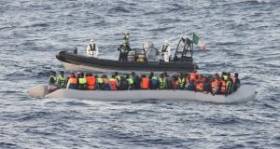Displaying items by tag: 10,000 people rescued
#10,000rescued - The Irish Naval Service were praised by Minister with Responsibility for Defence, Paul Kehoe for their continued success in assisting with the migrant crisis in the Mediterranean.
To date, the Naval Service has rescued more than 10,000 people since the navies vessels were first deployed to the humanitarian operation in May 2015.
In the period May to November 2015, a total of 8,592 people were rescued in the Mediterranean by the navy. In 2016 L.É. Róisín, which was deployed to the Mediterranean on 1 May, rescued a total of 1,264 people.
L.É. James Joyce, which replaced L.É. Róisín as previously reported on Afloat.ie began operations in the Mediterranean on 16 July.
Following the rescue of 162 people on Tuesday, L.É. James Joyce rescued a further 63 people yesterday. This brings the total number of migrants rescued by the Naval Service to date to 10,081.
Since the Irish Naval Service vessels were deployed on the humanitarian mission they have provided assistance to a further 2,209 migrants, who were transferred from other vessels onto the Naval Service vessels and then transited to safety.
Minister Kehoe said “I wish to congratulate the Naval Service for the excellent role they have played in saving the lives of so many migrants since Naval Service vessels were first deployed in May 2015. The Government and I are very proud of your efforts.”
Minister Kehoe added “The deployment of Irish Naval vessels to the Mediterranean to engage in humanitarian search and rescue tasks is an important element in Ireland's response to the migration crisis in the Mediterranean. The success of these operations demonstrates clearly the value of Ireland’s participation in this important work.”
Minister Kehoe went on to say “Unfortunately thousands of people continue to make the very dangerous journey across the Mediterranean. The requirement for humanitarian search and rescue operations in this part of the world remains and Ireland will continue to play its part.”
























































